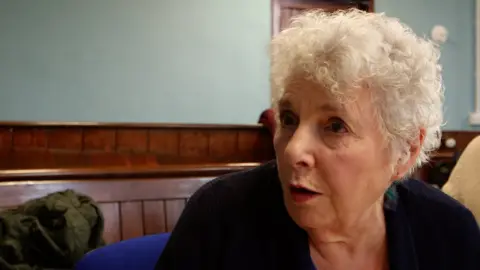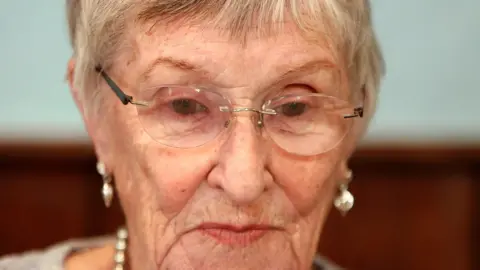Welsh pensioner poverty rates 'on the rise'
 BBC
BBCNearly one in five pensioner households in Wales are living in poverty as people enter retirement with insufficient savings or earnings, a charity has said.
A Joseph Rowntree Foundation report said poverty rates had been increasing for five years.
It said Wales had the second highest rate of pensioner poverty in the UK's nations and regions.
The Welsh Government said it was committed to addressing inequality.
The Department for Work and Pensions (DWP) said tackling poverty "will always be a priority for this government".
Some 19% of pensioner households are living in poverty, according to the latest figures dating from 2015-16 to 2017-18.
Poverty is defined as living in a household where the income is below 60% of the median income.
Overall, the report found Wales has the highest poverty rate of all the UK nations - a ranking it has held since 1994-95.
What do pensioners say?

Eileen Vaughan, 84, from Blaenavon in Torfaen, said making ends meet was harder now because "you've got to think about what you have before you buy it".
"We go into the shops now and things are going up every week," she added.
"We have the same money as we did years ago but you've got to manage that to what it is now because all the costs of living have gotten higher."
Her friend Anne Jenkins, 85, said she manages "all right at the moment" but "it's not so easy as it was years ago when my husband was alive".
"What I have is quite adequate," she explained.
But Mrs Jenkins added: "There's quite a big gap between pensioners with plenty of money and pensioners who just poddle along."
What about child poverty?
The proportion of children living in poverty in Wales has reduced to fewer than one in three (29%) and is slightly lower than the rate for the UK overall at 30%.
Despite that, 22% of children living in working families are in poverty as are 44% of children in single parent families.
Emma Williams, 37, has three children aged 16, three and eight months.
Ms Williams, who lives in Blaenavon, Torfaen, said that when she had her second child, Darwin, she was not entitled to Flying Starts, a scheme aimed to tackle child poverty.
When she returned to work at a housing association, she said the family paid for a child minder.
"It was really expensive, it was about £500 a month I think just for that," she explained.
"If I wasn't working full time then that's a big chunk out of your wages if you were part time."
But when they moved to a larger house across town, they became entitled to the scheme, which has been a "massive help".
Ms Williams added: "It's a postcode lottery isn't it?
"If you were earning minimum wage and having to pay that out [for childcare] I can see why people don't go to work."
Ms Williams said she does not believe it is getting easier for parents.
"I think the 30 hours of free childcare is amazing and I think that's a step in the right direction," she said.
But The Childcare Offer for Wales starts from the school term after a child turns three: "The support prior to that is really difficult.
"If I was to give up work now because it's really tough and the finances don't make sense, will I get the same job and the same pay in three years time than I would now?"
Claire Ainsley, executive director for the Joseph Rowntree Foundation, said they had noticed poverty "is high and remains high".
"It's too soon to see what's behind it, we think it might be that people are moving into retirement who haven't got sufficient savings or earnings to sustain them," she added.
The Welsh Government said it was committed to "doing everything we can to tackle poverty and inequality in Wales" and blamed the UK government's austerity drive and welfare cuts.
"Evidence does show however that Welsh Government action to make a difference to the lives of families and children throughout Wales is having a positive impact on the root causes of poverty and inequality," it added.
The DWP said getting into work "is the best route out of poverty and there are more people in work than ever before".
"Wages are outstripping inflation and absolute poverty is lower than in 2010," it added.
"Millions will see their benefit payments rise further from April and we're also boosting the incomes of pensioners each year through the triple lock."
